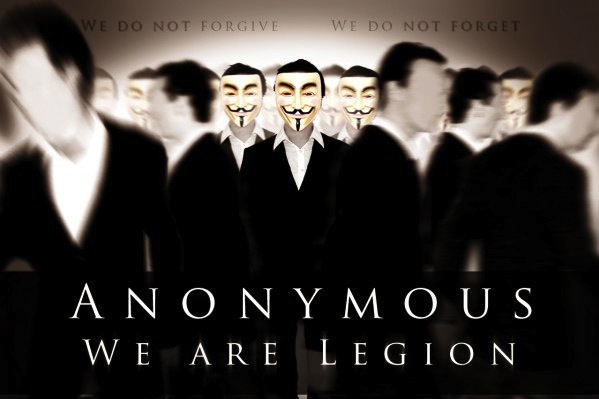A story David Graeber likes to tell about the first days of Occupy Wall Street purports to explain why the NYPD didn’t just evict us on the first night, thus preventing the movement from catching fire and spreading worldwide. He heard from a source that ‘white shirts’ on the scene were scared that if they violently evicted us the dudes in the Guy Fawkes masks would steal their credit card info and ruin their lives. I doubt that’s the full explanation for why they let us stay (it would have been an ugly fight, and there was no reason to imagine they couldn’t just wait for it to peter out) but I think it points, accurately, to the power of Anonymous in both real terms and in the popular imagination.
The new documentary, We Are Legion: The Story of the Hacktivists, traces the history of Anonymous from its shady days as a lulz-making prankster group on 4Chan’s /b/ board backwaters to its prominence in 2011 as a lulz-making collective of politically engaged hacktivists. The film tells the tale through interviews with members (anons), former members, writers, academics and, in one particularly interesting get, Aaron Barr, CEO of HBGary and target of one of Anonymous’ most famous attacks.
The film is a great overview for anyone interested in the history of Anonymous, and is particularly strong in covering Anonymous’ early days, during the silly, trollish escapades that would eventually give rise to a community capable of powerful political action. Having many anons tell the story themselves fills these events with an emotional and personal context that makes them seem immediate and engaging.
The documentary is organized in a direct, chronological line, listing Anonymous events, campaigns and controversies in a very straightforward way. As a result, it has to cover a lot of ground, and the film is not a particularly deep look into the philosophy or politics of the group. While there is no simple philosophy, no single ideology to Anonymous, many of their actions and public statements reflect an anti-censorship, anti-corporate and state power tendency, as well as a devotion to anonymity, horizontal organizing, freedom of information, and, of course, lulz.
But while the film may at times offer too-schematic a view of Anonymous, it never oversells the power and importance of its subject, a trap many documentaries fall into. Anonymous really did play a vital supportive role in providing internet assistance in Egypt and Tunisia during Arab Spring, and were also avid supporters and participants in OWS. Anonymous has been quieter lately, and this has partially been a result of tremendous repression against the group since the film finished shooting in late 2011. The film touches on some of these cases, and the absurd charges that are being brought against anons.
In one glaring example, which has largely occurred since the film’s completion, anon Jeremy Hammond has been held without bail for 8 months and is facing 30 years to life for his alleged involvement in hacking security firm Stratfor, a sentence completely out of proportion to his crime. Imagine if he hadn’t been hacking, but had instead walked into Stratfor headquarters and stolen a briefcase full of information. He would certainly be charged with a crime, but 30 to life?
These proposed sentences for Anons that go well beyond the scope of the crime are outrageous, but they also point to the fact that Anonymous constitutes a truly powerful force in the political landscape, one that the government is eager to smash. The Anonymous motto: “We are legion. We do not forget. We do not forgive. Expect us” strikes fear in the heart of repressive corporations and states around the globe. This film gives a clear and compelling explanation why.









